
Share
Baby Sleep FAQs Answered
Interview with @throughthenight.sleep
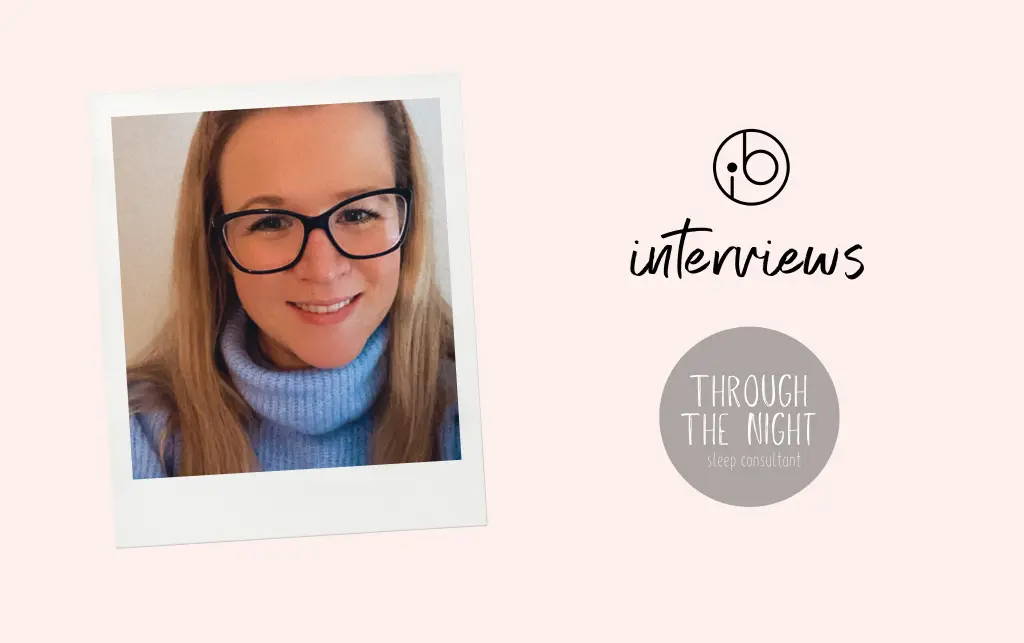
To mark Sleep Awareness Week, we wanted to carry on the conversation about sleep. At Ickle Bubba, we understand how important a good night sleep is, for parents as well as baby. So, we wanted to help parents discover more about their little one’s sleep patterns, because it’s important to share information on these topics to break down the taboo and stigma around struggling with your little one’s sleep.
After multiple times of asking herself, ‘Why is my baby the only one that isn’t sleeping?’ Hannah Bott, an NHS Sleep Consultant, created @throughthenight.sleep where she not only shares her own experiences but gives help and advice to any parents in need. We spoke to Hannah and got her to answer all your burning snooze-based questions, especially how to tackle the dreaded Daylight Savings clock change…
Watch the interview or scroll down to read the full transcript.
So, Hannah, thank you for joining us and please, give us an intro to yourself…
I am an NHS Sleep Consultant and have got into this because I was also a sleep deprived parent. My little boy is now, well he’s 3 in July, so however old that makes him!
He was just horrendous. An awful, awful sleeper. He was up every hour. I breast fed and literally would just move him from one boob to the other. I’d got myself into this awful vicious cycle of not feeling I could do anything but wanting to do something. And then, when I would try something, and it didn’t work.
Then sleep deprivation causes you to go into an awful state of thinking you’re doing the worst things and why is everyone else doing it right.
The question I asked my self all the time was ‘Why is my baby the only person that isn’t sleeping?’.
And the amount of clients that say that to me, and my response now is always there are so many incredible Sleep Consultants out there – there wouldn’t be so many if you were the minority.
Most babies, most families struggle with sleep. And this is so good that it’s becoming a conversation that we all talk about and it’s okay to ask for help.
So, I have been you, I have been exhausted and now I am so happy to help as many people as I can.
Yes, I think once you’ve had no sleep, you’re ready for anything. We’ve got to get rid of that stigma of embarrassment or that you’re not being a good parent. Because kids are just kids.
Exactly! And we’re currently going through a period of really early morning wakes.
Now, some people will say why are you saying that?! But actually, just because I have helped you with your sleep just now, doesn’t mean that your sleep is going to be perfect forever.
I think it’s important to talk about that as well, but my aim is to fill you with confidence and tools so when those things happen, you know what to do.
You don’t think, oh my gosh, we’re going back to square one. We’re never going to get sleep again. You’re like, ‘okay, this is happening… this is the reason for it… I’ve got X, Y and Z that we can use to solve it.
Sleep is never perfect; we know that as adults!! And just because they’re babies, and young children doesn’t mean that it’s going to be perfect so it’s about empowering parents to have the knowledge of how to help sleep.
Thanks Hannah.
Let’s kick off with our first question – which asked by a lot of people. When is it best to start sleep training? Is there an age, or a certain development period?
So, sleep training is not suggested to be done until about 5 ½ - 6 months. Purely because you will have all heard of the ‘4 Month Sleep Progression’, and when this hits there is a biological change, so before that period babies up until about 3 months don’t have a cycadean sleep rhythm – so they don’t have a body clock. They have 2 sleep cycles, so every time we have a sleep, we will go through sleep cycles. Babies, before the 4 Month Sleep Progression, will have an active phase and a light phase. So, they will only have two sleep cycles. They don’t actually have deep sleep. When they go through the 4 Month Sleep Progression’ that changes, and that is where they get the deep sleep, the REM sleep and the non-REM sleep. Which is what we then have as adults. It doesn’t change again.
So, it is not suggested. And actually, one of the most important reasons for not doing it before that point is because those first 3 months, is the 4th trimester. So, you’ve had 3 trimesters whilst you’ve been pregnant, and the 4th trimester is the first 3 months after birth. That is about building that relationship, making baby feel safe and happy, meeting their needs. You get the cluster feeding, you get the sleepless nights, and that is expected at this point. You get the contact naps and all the things you get as a parent and you think ‘Oh, why is this happening?’. I did the same, I spoke to the Health Visitor and said, ‘he’ll only nap on me, he will not let me put him down.’. That’s so normal! But if you consider where they have come from, where they are 24 hours with you and can hear your heart, they can smell you, they’re getting food on demand, they’re sleeping whenever they want, to then be pushed or pulled – however they come – into this world which is light and bright, and completely different. So those first 3 months are so important to just enjoy it and try not to get too stressed.
So, sleep training is after that 4 Month Sleep Progression, which happens somewhere between those first 4-6 months. Again, it doesn’t always happen at 4 months. But that doesn’t mean there aren’t things you can do from birth.
You can set up a little nap routine, so you can start thinking about how frequently they are going to be napping, there’s so many things you can do.
But actual sleep training, where we would create a plan and you would choose a method, that works for you isn’t until sort of 5 ½ - 6 months. Which often correlates with when they end up moving into their own rooms.
Someone left a comment saying, ‘just knowing that you can enjoy the first few months is so reassuring’. And that’s it, you’ve got that time to maybe not relax but to bond.
Yes exactly, and being a pregnant lady you will have been told so many times, it goes so quickly, just enjoy it, and you’re like ‘Yeah, yeah, yeah…’ and that’s one of my biggest regrets, I was so fixated on how is he sleeping, how am I sleeping, how can I make everyone sleep better, how can I get him to sleep in the Moses basket, all these questions, constantly. And then, you click your fingers and they’re nearly 3! It goes so quickly, and some people will be first time round, but potentially know this is their last baby, they’re not going to have anymore. Just enjoy it. Nothing is “unfixable”. Nothing is a bad habit, just enjoy that time with your baby.
And then they’ll be 18!
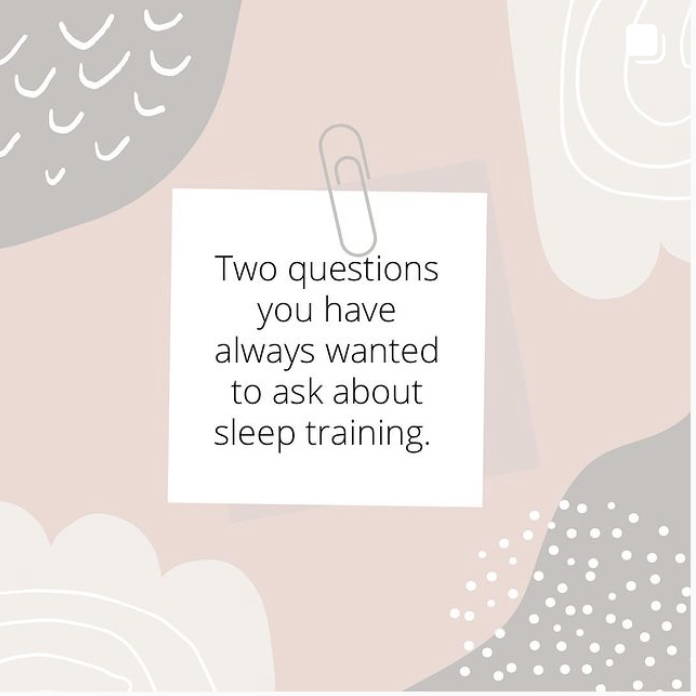
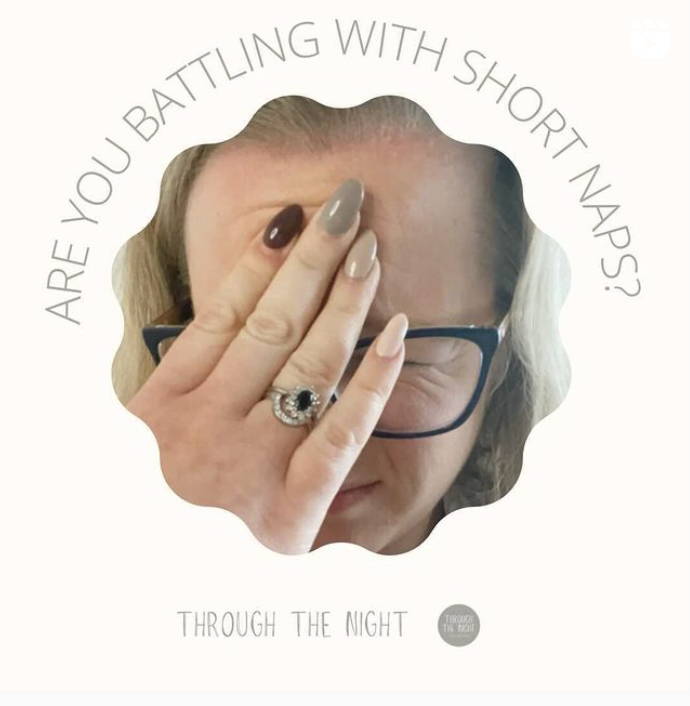
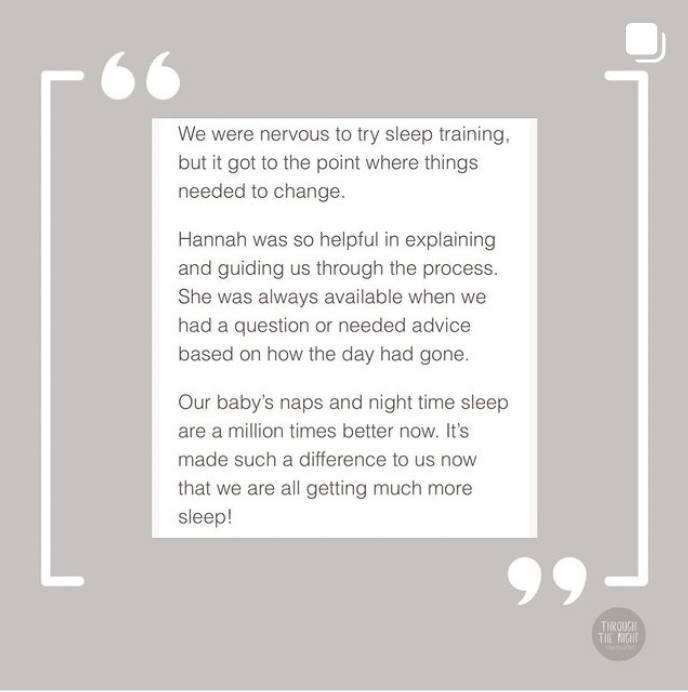
So, I think going back to the sleep training, you mentioned there’s a few things you can do prior to starting sleep training. Is there anything that you would recommend? Any tips or tricks you can help our followers with?
So, now routine. Lots of people will think ‘I’ve got to be set to a time frame, and a time limit’, some people love that, but it doesn’t work for a lot of people and if you’ve got older children who are here, there and everywhere then it isn’t manageable.
But in terms of a routine that is manageable, is a bedtime routine. Whatever time you do bedtime, doing a bedtime routine, of no more than 30 minutes, and it can be less than. But no more, so you’re not over stimulating them. If you can mirror, even just those last 5 minutes of a bedtime routine before a nap, whether that’s a nap in the pram, in the Moses basket, on you , in the cot, wherever that is - if you can just mirror those last 5 minutes – which if you think of 5 minutes of the day – it is so beneficial of showing your baby that sleep is coming. And it could be a case of having a feed, having a burp, singing a song and saying a phrase. It can literally be as simple as that, it doesn’t have to be complicated, but consistency (and I find myself saying that a lot) is so important.
Children and babies thrive off your cues. They’re looking for them to show you what to do. If you can be consistent with just 5 minutes before sleep, it is so beneficial.
Also, looking at the wake windows, or the nap gaps. Babi9es, especially new-borns, the nap gaps or day sleeps are going to be very sporadic, they’re going to be asleep between 16-18 hours of the day Which is a lot! And that could be half an hour naps, or 2-hour naps, it is so variable. And actually, we think we we have to keep them awake but, for example, a 3-month-old probably after an hour and 15 minutes is ready to go back for another nap.
It’s very, very easy to get an overtired baby, and they’re very hard to settle. So, look for those sleep cues, they can be as suitable as a change in colour in their eyebrows or eyelids. They could start touching and tugging their ears, they can start looking in other directions and avoiding eye contact. And then there’s the more obvious ones like they become grumpy and crying and all those things. But looking for your baby’s sleep cues and learning from them, as well as them learning from you, is so important.
And, my third thing is, just pausing. Practise a pause, so active sleep and light sleep are the 2 sleep cycles they go through before the 4 Month Sleep Progression. Light sleep is where they look sound asleep, like nothing is going to wake them up. Active sleep is often confused with where they look like they’re waking up, it can be very noisy, they can look like they’re stirring, they can even cry out, but they’re still asleep. And our natural impulse/reaction is to go rock the thing, or pick them, or do whatever to quickly get them back to sleep again. And all you do is then disturb them and wake them up. So, just actually practise pausing and see what they do. They’re either going to go back to sleep, moan or move around for a little bit longer and go back to sleep, or they’re not. In which case, you go, and you respond. And I am not saying minutes, I’m talking seconds. Sometimes just practising that little pause can be so beneficial, especially in those early days because that active sleep is often misinterpreted for waking up.
And I suppose, you just run to them to make sure they’re okay.
And equally, if you do end up waking them up and they want to sleep on you for the next two hours. Great, you get a little cuddle, it’s not the end of the world it is just practising. In those early days, it just practise. Some days it might work, sometimes it won’t work. If it works one out of the 5 naps of the day, then amazing. It’s better than nothing.
Yes, definitely! And then going back to when you said about them stirring when they’re in active sleep, what would you recommend doing when they wake as parents are leaving the room?
So, I am presuming the person’s child is a little bit older, over 6 months if they’re in their own room. So, what’s probably happening here is that, that child has an association with sleep, i.e., they require something to be put in place to aid initial sleep and then quite simply they need it reinstated. If you think, sleep is a completely different thing to anything else we teach our kids. When our children are born, they know nothing, we teach them how to walk, roll, and sometimes they’re born and they sleep well, and they are the lucky ones. But most of the time they are not, and they are shown to do it. And as a parent if you don’t know how to do it then you are all just stabbing in the dark. And if we showed them to walk on hands, we would walk on hands. So essentially if they only know how to fall asleep one way, when they stir from sleep cycles and need to link from one to the next, they are going to seek whatever it was that was put in place at the beginning. That’s not to say they’re doing anything wrong and not that you’ve don’t anything wrong, it’s completely normal and I’d say 95% of the people that I work with have an association. So, there are lots of ways you can support this. If it’s a 3-year-old, I would say visuals, so timetables to show sleep is coming, rewards, positive praise, talking to them about it and making them feel like they are involved in what’s going on.
The main thing is, how do you want to respond?
Do you want to leave the room, in which case you’re doing the right thing – and however comfortable you feel leaving them for, 30 seconds or 2 minutes, you go, and you return, you comfort them, and you leave. If that’s what you want to do, then that’s the right thing. If you do that because that’s what you’ve read and that’s what you need to do, but you’d feel more comfortable staying with them then you can absolutely stay with them. You do not have to leave the room to teach children how to sleep.
Think about how they’d prefer you to fall asleep, whether that’s in your arms, or on your knee, and just think about how you can gradually change that. Really subtle changes, so it could be instead of rocking them, you would walk around the room. Instead of staying over the crib for a long time, you would pat and shush and rub so they know you’re there and subtly change until you’re at the end of the door and they’re quite happy for you to leave. That does take longer, but so much online when you Google ‘How to make my child sleep better’ doesn’t really suggest the gentler option.
In that lady’s case I would say just decide with what you’re happy to do., If you’re happy to leave and return, then just keep going - consistency is key. I am saying it again! And how you comfort them in there is up to you, if you want to pick them up and give them a cuddle then give them a cuddle, if you want to try and keep them in their cot then do that. There is no right or wrong way, it is about finding a way that works for you and your family, and your baby.
That’s great, and I think that piece of advice will be so helpful for so many people. Onto another big part of sleep is napping. So, whether it’s a danger nap or they’re just not tired enough to nap, should you make them nap? What’s your advice on napping? Especially at different ages or they’re stating their sleep training…
So, nap gaps are an average. Some babies or children can go longer, some can’t go that long. But I always say to people they’re an average for a reason, so try not to steer too far from it. And quite often, a child or baby that presents as not ready for a nap is past the nap. And it is so so easy to do that - to miss that window, because it is so subtle. And that is why the average nap gaps are good just to have as a point of reference, to think I am coming towards the end of this nap gap let me just look at what they’re signalling to me. So, if a child is overtired, they are going to be hard to fall asleep, they are going to be past it. You know as adults if you are tired, it sometimes hard to fall asleep. So, I would look at the nap gaps and make sure you are really confident in what is right for your baby. And the best way to work it out is, think of a 1-month-old, 45 minutes is the average [nap gap], then very month they get older add 15 minutes. So, 2 months is an hour, 3 months is an hour & 15 minutes, etc. That will give you your average to work towards, but as well as this, day sleep is so frustratingly tricky. I am sure you’ve been told, ‘It is so important, it’s the crux of night sleep’, so you put so much pressure on yourself. Ultimately, if you know they’re going to fall asleep on you and you’re happy to sit down for 2 hours, and watch something on Netflix, then do it. Yes, day sleep is very important but again, but we get fixated on the naps, and sometimes we have to be a bit more flexible. Naps are so tricky because, they’re so many things that go against nap, we’re not producing Melatonin, the world is awake, whereas the world is quieter. You can make it as black out and as white noise as possible, but the world is awake – the postman might come! There are so many things against naps but just look for that nap gap and don’t put too much pressure on yourself.
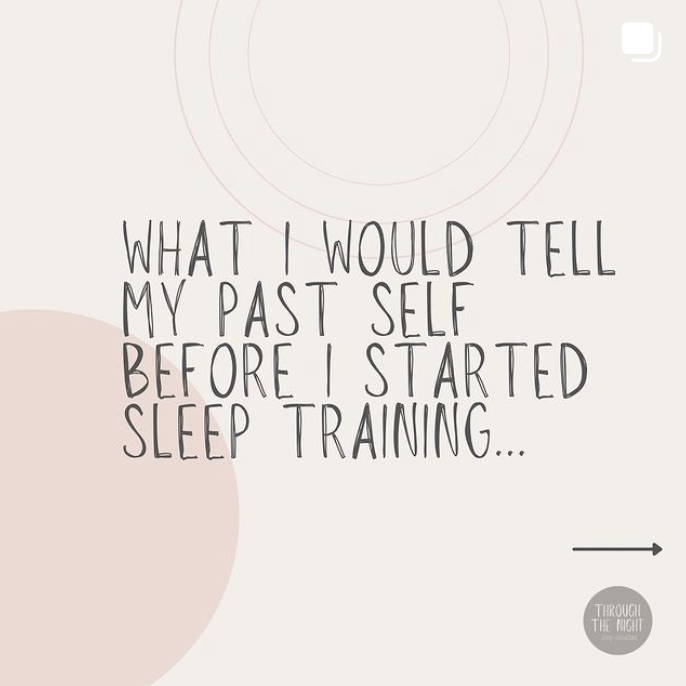
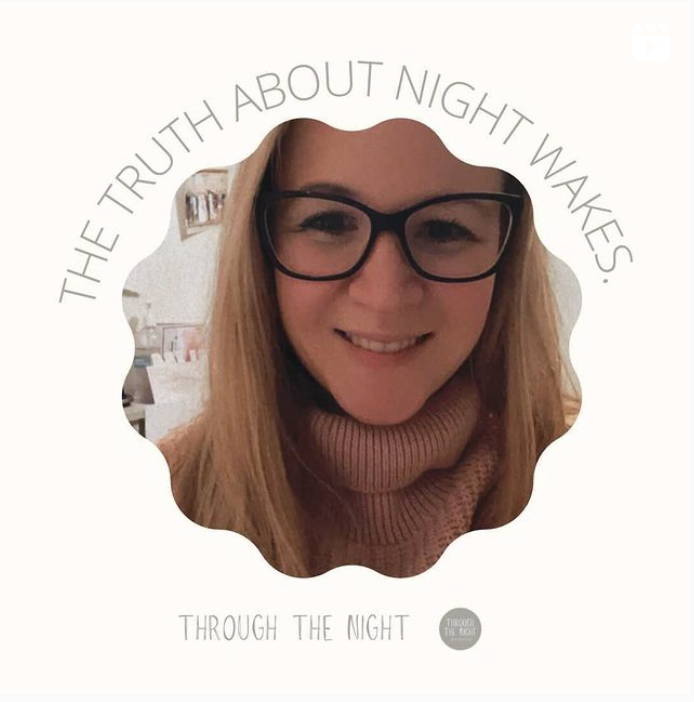
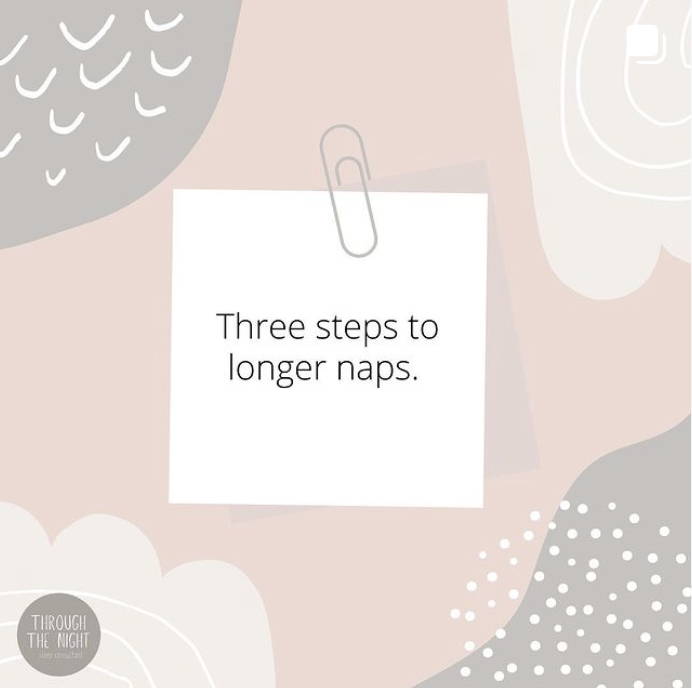
That’s it, there’s a lot to learn on top of sleeping, and the routine will get there eventually. Perfect, another question we got asked was my baby wakes early how can I get them to sleep longer?
This is currently my problem, there are lots of things. The first thing I would say is if you have an early wake and that is the only issue with your sleep, that is when they know this is the only problem on its own. If you have a little one who is waking frequently in the night and still starting the morning early, it’s more likely that it isn’t an early wake problem or an early wake solution to find it looking at the crux of the sleep cycles. So, by supporting them with that, you can then help the early wake because they will then independently link those last couple of sleep cycles.
So, I don’t know this person’s situation but most importantly is to decipher whether it’s an early wake or a sleep cycle situation is the first thing. If you have just an early wake problem, I always follow this pattern. The first thing I would do is put them to bed a little bit earlier – which sounds ridiculous – but it’s likely that the day sleep is having something to do with it, so maybe they’ve not had enough day sleep, their timings have been a little bit different, but even with 15 minutes/half an hour, just bringing it earlier it might help. Try this for a couple of nights and you’re going to know after a couple of nights whether that’s made a positive impact on your early wake. If it hasn’t then I would do a couple of nights with it being a bit later, because sometimes it is just a case that the sleep pressure hasn’t built up enough for bedtime, so although they have fallen asleep well, they’ve had enough sleep. Now there is also potential that there is habitual wake, in this case we can try to break that habit and manually shift the sleep cycles. So, those first 3 – 4 hours of the night is deep sleep – if they have gone through the ‘4 Month Sleep Progression’, so when you go to bed they are likely to still be in deep sleep so go into them and stir them – meaning touch them or roll over – and if they do wake it is fine because they are in a deep sleep so they are not going to full wake up. But what you are doing is manually putting them into the next sleep cycle earlier than they would. So, if they’re normally at the end of a sleep cycle at 5:30am because you have shifted that earlier in the night there is the potential that they are going to be in the middle of a sleep cycle at 5:30am so they are not going to wake up as early. So, if it is a habit, you can try that.
Also, and this is where we have done a full circle this time round because we have had a few bouts of early wakes is looking at the whole sleep that they are getting. So, for example, yesterday Albie got 2 hours sleep in a nap, in the day. We are lucky that he still naps and wake him more or less every day because he’d just keep going. So, we woke him after 2 hours, he was asleep by 7:30pm but he woke up at 5:30am. So, if I add all that sleep together, he’s had 12 hours which is what he needs. So, although he woke and started the day at 5:30am he’s had enough sleep, so he’s had the top end of what he needs – so today, I’ll let you know how it goes but we’ve capped his nap to an hour and a half, he’s gone to bed a little bit earlier and hopefully that will mean that he wakes a little bit later.
But anything that you do you have to give it a bit of time, you must try something for you know 3, or 4 days on the trot. Then you will be abler to see if it is working, and if it hasn’t then dive into that tool kit and try something else because early wakes are all about essentially having a tool kit of things to try.
If they are at nursery or childcare, you will probably get fed at about 4:30pm, so I would always offer a supper because that’s quite early, so there is the potential that if that’s the last time they ate by 5:30am they’re going to be hungry. So, as simple as offering a little bit of supper can help.
Or checking that your heating doesn’t come on at that time, the neighbours don’t get up and set an alarm off at that time, just little things that you probably haven’t even thought to look at. But they can make a difference.
That’s where you’ve got your routine, but having that toolbox is what you need to keep trying things out and it’ll click into place at some point.
Exactly, you’ve just got to keep going and know that at some point you’re not going to be getting up at 5:30am for the rest of your life.
Perfect, and another one of the questions we got sent in was about holidays and change in time. And I suppose, this is important with the clock’s change on Sunday. So, people are asking whether they’re going abroad or with the clock change, how can they make sure that sleep doesn’t duffer?
Okay, so clock change. This is the one that effects people less, because if they normally wake up at 5:30, naturally that will be 6:30am. So, you’ve got 3 options.
1. You can do absolutely nothing, and just see how they get on. I think most people will opt for that with this change.
2. If you want to take more control with the clock change, you can, the night before put them to bed 30 minutes later.
3. Or you can 3 or 4 nights before you can start doing 15 minutes later. And then you ever so gently get their body clock ready for it.
But with this one, more than any, don’t worry too much about it. If you think of when you go on holiday and there’s an hour difference you wouldn’t try to prepare them for it, you just see what happens. It’s essentially the same.
The one where we go back, you get an earlier morning potentially, so people stress a little bit more about that one. But with this one, you’ve got options but essentially try not to worry too much about it.
With holidays… I always put in the same category as illness, or teething. There is nothing you can do about it, and if you are worrying about their sleep before you’ve even got on the plane, or car, that’s already going to put a dampener on your holiday. Try not to worry, if they are poorly or they are teething, you naturally will support them more. Being on holiday is a different environment, if they want more support that is completely normal because they need and are seeking that safety blanket form you. So, try to keep your bedtime routine the same, try to keep nap gaps the same - just as much as what you can form home, mirror. Everything else, just enjoy the holiday and know that it’s not forever. Anything that happens if they end up being in bed with you for a week when they get home the likelihood is they’re not even going to associate that, and they’ll be back in their room thinking this is where I sleep.
Just follow their lead with it, and if they need more give them more. It’s okay when you get home things will return. And if they don’t then there’s always whelp out there.
Thanks Hannah, and now we have holidays we have to look forward to them.
Yes, don’t let sleep, or the worry of sleep stop you from going away!
So, then we’ve had a few specific from people and I wanted to get them answered for these followers. So, @rachelcarley asked “My 13-month-old has always slept through the night. Why has she suddenly started waking?” I suppose we’ve kind of covered this throughout…
So, I’d look first at day sleep, so at 13 months they’re probably still on two naps and still need this. It’s normally at 18 months where they start to think about dropping the nap. Just as an average suggestion, you are maybe having a nice big nap in the morning and then a shorter nap in the afternoon- or they are starting to fight that, so it is not as long. So, you can think about the timings of your naps, capping that first nap so then you’re second nap becomes earlier so they can sleep for longer and they’re then ready for bed, you might need to put bed back a little bit. I’d also look at potentially, how much sleep are they getting during the day so for 13 months it’s somewhere between 2½ and 3½ hours that we’d be hoping for them to get. If they are not getting that then I would bring bedtime forward to compensate that.
Teeth. Teeth play a big, big part. Are they showing signs in the day of teething? If the answer to that is yes, then unfortunately there is no magic wand, no trick to deal with that. You must support them however they need you to. Sometimes there are teeth that come out of nowhere, and others you know they’re coming. SO always look to teeth, always check that there isn’t anything wrong health wise, that they’re okay. Potentially they’re not poorly now but they’ve just been poorly, or they’ve just had a teething spell, so naturally as they get older, they are going to have preferences, so they think ‘I did that, and they responded this way. Now I am not doing that they are responding this way... So, if I go back to that they might respond that way again’. And that’s normal to have something happen before and then seek it again. So again, it’s about looking at that, whether it’s leaving and returning, staying with them.
There’s lots of different ways to do it but it’s hard to just answer that one way because there could be so many reasons why that is happening. That’s why the support that I offer and the first thing you do is fill out an 8-page questionnaire. It gives me so much detail because there can be so many answers to that question.
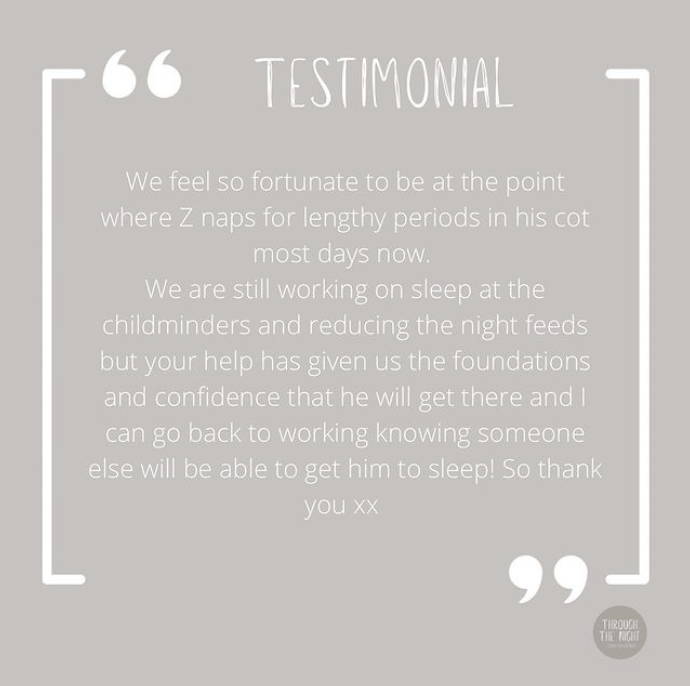
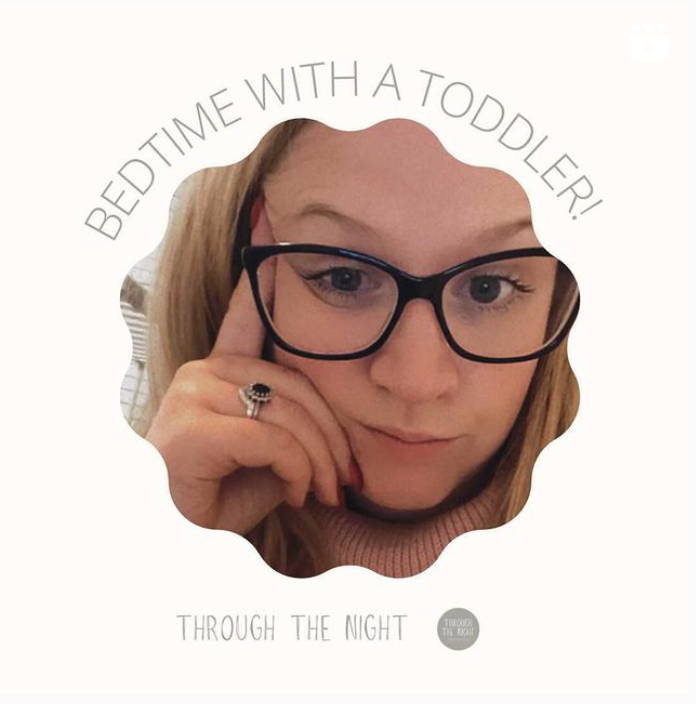

So hopefully there’s something in that for you Rachel, maybe you wanted a one-word answer, but that toolbox is needed for you.
Another on which is from@ thischarminggracie was about sleepwear so with the Summery days we’ve just had, I think it’s got us thinking it’ll be here forever so is “What are the best things for baby to sleep in in summer?”
So, I would say make sure you’re looking at the tog, if you’re using a sleep suit; just like us with duvets if it is too heavy it is going to cause discomfort. Essentially, if you are abroad, I would probably just have them in a vest, but they might want a sleep suit or a think blanket. But our body temperature rises in the night anyway so not too much. If you are testing how hot they are, don’t test their hands or their feet, they are naturally colder there, so feel their tummy of their back. That’s going to give you a good inclination as to how hot they are going to be. Now, even though the days are warmer at the minute the nights are still cool, so I wouldn’t really be doing anything different to what you’ve been doing. As the night’s get warmer, just follow their lead. You know them. If you’ve got long sleeves on in the day then you need something long sleeved in the night time, you might just take a layer of in terms of no vest. Or, if they are just in shorts and a t-shirt, they might just want to be in a short-sleeved vest or a shorts and t-shirt pyjamas set. They might kick the duvet off, and if they do you can put it back on, but I would give them a little feel and check if they’re too hot.
And I think with the optimism of hot weather it’s got everyone excited about this! Another question we had was from @our. reality_life, asked “My girl always wants a bottle at 4am but has 3 meals a day plus snacks – do you have any advice?”
So, it sounds like it is a habit, although you could try supper, because if she is genuinely hungry then that would be about the time to wake depending on what time they have tea. Or, if you feel like you know she’s just doing it as a habit and I don’t want to continue doing it, because if you’re happy to then continue as it’s not doing any harm. If you want to stop the feed, there are a couple of ways to do it, so you could go cold turkey, stop and support her in a different way. Don’t just stop and leave her to sort herself out, she obviously wants comfort for a reason, so you need to replace that in a different way. That could be and calming her, picking her up and giving her a cuddle and letting her fall asleep in your arms and transferring her. There’s lots of different ways to do that, but if you just go cold turkey and stop with the bottle, or you can gradually reduce the number of ounces you are giving… until you get to two ounces and then you can stop. The likelihood is if you’re doing something gradual, she is still going to seek comfort from you, so it is deciding how and what you want that comfort to look like. But the biggest question to ask to start with is do you want to change it, or are you happy?
Perfect, thank you Hannah. Just scrolling through the comments on the live to make sure we’ve covered everything. @fionacurry asked “Should I get my almost 2-year-old to go to sleep in her cot herself? Right now, we get her to sleep in our bed and transfer her – she sleeps all night though?”
Unless you want her to fall asleep in her cot, and not your bed then no. If she sleeps all night, then no. If she was waking then I’d say she’s seeking the last thing she saw which is being in your bed, so she’s thinking ‘why am I in a different space’ but if she is sleeping through the night and you are happy for her to fall asleep in your bed and to transfer her when she’s asleep and that works, that’s fine.
And to coincide with that, someone later has put “They’ve had to move their little boy back into their room because he’s sleeping in his own cot and keeps waking through the night and won’t settle as he knows we are in bed…” So, the complete opposite.
Yes, and that is tricky. Sometimes you must revert to what can feel like an extreme – bringing them back into your room but in their own bed. Get them confident in sleeping in their own bed and hen transfer them into their own room. Then you can support them that way. Or, sometimes you must put in a middle steppingstone so it might be a case of you were in the same room, in your room, so now you are going to be in the same rom as them but in their room. And that might be a blow-up bed on the floor for a little bit, so you get them used to being back in their rom when they are happy to be in there, you can then remove yourself. How you do that, whether it’s quickly going and returning, or gradually, sometimes you just must put in that steppingstone to keep everything the same in a different environment to help them adapt.
And like you say it’s those habits, and that toolbox where you can go back and try to find a solution for you and baby. That’s all the questions, so thank you Hannah!
Thank you for having me, and I suppose my biggest thing to say to parents is, and this has been said to me about 3 times today, ‘I know I shouldn’t be’, or ‘I know I’ve made a bad habit, or ‘I know it’s wrong to...’. There is NO wrong way to look after and sleep with your baby – if it works for you, it works for you. Don’t let what you read or what you’re told, or what you see cloud how you are parenting. You are you, and your baby is your baby. You know them best. There are no bad habits, there is no wrong way. You have just done what you know how to do. Don’t let anyone else make you think anything different.
I completely agree with that, and like we said at the start at the click of your fingers they’ll soon be turning 3 and it will go before you know it. It might be difficult but there’s help there and eventually they will grow up.
Yes, equally if you’re sat here watching this and you’re thinking god, I want to sleep so desperately, I want to ask for help but for fear of what people will think of you for doing that, do what’s right for you. Sleep deprivation is used as a form of torture for a reason. If you are sleep deprived and want to make a difference and the opinions of someone else is what is holding you back, don’t let it. Do what’s right for you.
Exactly, that is great advice. Thank you, Hannah, and on that note, we recommend you go and follow Hannah. She has amazing tips, tricks and advice – everything you need including a reel about the clock’s changing!
Thank you so much, Hannah. Thanks for joining us, it's been an amazing chat with lots of great advice. Don't forget to check our more of Hannah's top tips over at @throughthenight.sleep

